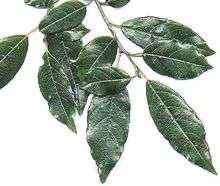Rhamnus prinoides
| Shiny-leaf buckthorn | |
|---|---|
 | |
| R. prinoides foliage | |
| Scientific classification | |
| Kingdom: | Plantae |
| (unranked): | Angiosperms |
| (unranked): | Eudicots |
| (unranked): | Rosids |
| Order: | Rosales |
| Family: | Rhamnaceae |
| Genus: | Rhamnus |
| Subgenus: | Rhamnus |
| Species: | R. prinoides |
| Binomial name | |
| Rhamnus prinoides | |
| Synonyms | |
| |
Rhamnus prinoides, the shiny-leaf buckthorn, is an African shrub or small tree in the family Rhamnaceae. It was first described by French botanist Charles Louis L'Héritier de Brutelle in 1789.[1]
Description
Rhamnus prinoides occurs from Eritrea to Ethiopia to South Africa at medium to high altitudes. They grow near streams or along forest margins. The small edible fruits are shiny red and berry-like.
Uses
The Rhamnus prinoides plant has many uses amongst the inhabitants of Africa. All parts of the plant are harvested and used for nutrition, medicine or religious purposes. Gesho, as it is known in Eritrea and Ethiopia, has a considerable value in these countries. It is one of the most precious crops used both locally for domestic use, and fabricated products industrially.
In Eritrea and Ethiopia, where the plant is known as "gešo" or gesho,[2] it is used in a manner similar to hops. The stems are boiled and the extract mixed with honey to ferment a mead called "mase" in Tigrinya and "tej".[3]
It is also used in the brewing of tella ("siwa" in Tigrinya, and "tinsis" in Amharic), an Eritrean and Ethiopian beer.[4] This local drink is made from gesho as a major ingredient. Gesho leaves are sundried and pounded with mortar and pestle into flour. Barley malt is prepared and sundried and ground. These two ingredients are mixed, the proportion varies from person to person, and fermented 3 to 5 days on average. Finger millet (or sorghum and maize flour regionally) are baked, and finally mixed with the fermented solution. Then after 1–2 days of stay and fermentation the "tella" can be filtered and supplied for drink locally called "guesh" ("tsiray" in Tigrinya) and may stay for 3–4 days after filtration. The local drink "tej" is basically prepared from honey and gesho.
Gallery

Foliage 
Flower 
Unripe fruit 
Ripe fruit
References
| Wikimedia Commons has media related to Rhamnus prinoides. |
- ↑ "Rhamnus prinoides L'Hér". Germplasm Resources Information Network (GRIN). Agricultural Research Service (ARS), United States Department of Agriculture (USDA). Retrieved 24 October 2010.
- ↑ Pankhurst, Rita. "Gešo ". In Encyclopaedia Aethiopica: D-Ha, edited by Siegbert Uhlig. 773. Wiesbaden, Germany: Harrassowitz Verlag, 2005
- ↑ Richard Pankhurst, Economic History of Ethiopia (Addis Ababa: Haile Selassie I University, 1968), p. 194.
- ↑ Amborn, Hermann. Sewa in Tigringa "Ṭälla." In Encyclopaedia Aethiopica: O-X: Vol. 4, edited by Siegbert Uhlig. 848-49. Wiesbaden: Harrassowitz, 2010.
- "Rhamnus prinoides". Plantz Afrika. Retrieved 2010-03-04.
- Trees of Southern Africa, K C Palgrave, 1984 ISBN 0-86977-081-0